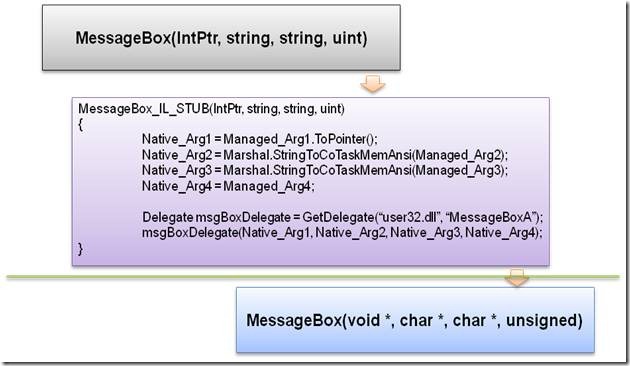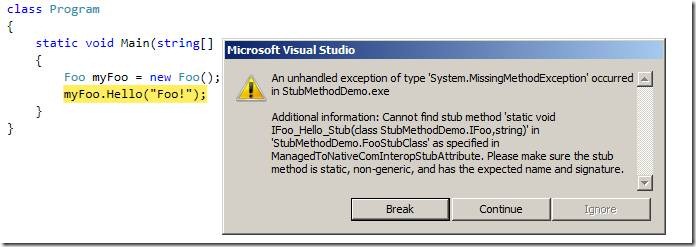.NET Framework v4.0和VisualStudio 2010 Beta1已经出来有阵子了,估计有些喜欢尝鲜的朋友已经下载试用了。这一次发布包含了大量的新功能。我们上海CLR开发团队会编写一系列的文章介绍Interop的相关新功能。我来给大家简单介绍一下Stub Method Redirection功能。这个功能是CLR上海开发团队设计、开发并测试的新功能之一,这一次我们上海CLR小组共开发了下面几个功能
1. Managed TlbImp (Rewrite)
2. Stub Method Redirection
3. IL Stub ETW Diagnostics
4. Custom QueryInterface
而在CodePlex上面:
1. 发布了TlbImp的最新版本,包括基于规则的Customization(具体可以参考:这一篇)
2. 即将发布IL Stub Diagnostics Tool,可以方便大家直接观看IL Stub,内部使用IL Stub ETW Diagnostics新功能实现
除此之外,还有一些功能是由美国团队开发的:
1. NO PIA
2. IL Stub Everywhere
3. Limit Pumping
4. PreferComThanRemoting
除了NOPIA在我之前的文章已经介绍过之外,其他功能我们会陆续写文章介绍。这次我们先介绍Stub Method Redirection。在介绍这个功能之前,有必要先介绍一下相关的背景知识:
什么是IL Stub
大家都知道,在进行Interop调用的时候,CLR会对参数进行转换(也就是所谓的Marshalling),然后再调用到目标函数。这样一个参数转换和Marshalling实际上是一小段Stub(桩代码)来负责的,比如在调用MessageBox的时候,MessageBox_IL_STUB就是负责Marshalling和参数调用的Stub:
当然了,这里的Stub的内容只是一个简单的抽象,实际的内容会比这个复杂一些。在实际情况下,CLR在第一次执行MessageBox的时候,会动态生成MessageBox对应的IL STUB,使用内部的类似于ReflectionEmit的机制直接输出IL代码的Byte Code,然后交给JIT来编译之,比如MessageBox对应的IL Stub是这样子的:
1: .maxstack 62: .locals (native int,int32,native int,int32,native int,native int,int32,native int,int32,int32,int32,int32)3: // Initialize {4: /*( 0)*/ call native int [mscorlib] System.StubHelpers.StubHelpers::GetStubContext()5: /*( 1)*/ call void [mscorlib] System.StubHelpers.StubHelpers::DemandPermission(native int)6: // } Initialize7: // Marshal {8: /*( 0)*/ ldc.i4.09: /*( 1)*/ stloc.010: IL_000c: /*( 0)*/ nop // argument {11: /*( 0)*/ ldarg.012: /*( 1)*/ stloc.113: /*( 0)*/ ldc.i4.114: /*( 1)*/ stloc.015: /*( 0)*/ nop // } argument16: /*( 0)*/ nop // argument {17: /*( 0)*/ ldc.i4.018: /*( 1)*/ stloc.s 0x419: /*( 0)*/ ldarg.120: /*( 1)*/ brfalse IL_003721: /*( 0)*/ ldarg.122: /*( 1)*/ call instance int32 [mscorlib] System.String::get_Length()23: /*( 1)*/ ldc.i4.224: /*( 2)*/ add25: /*( 1)*/ stloc.326: /*( 0)*/ ldc.i4 0x10527: /*( 1)*/ ldloc.328: /*( 2)*/ clt29: /*( 1)*/ brtrue IL_003730: /*( 0)*/ ldloc.331: /*( 1)*/ localloc32: /*( 1)*/ stloc.s 0x433: IL_0037: /*( 0)*/ ldc.i4.134: /*( 1)*/ ldarg.135: /*( 2)*/ ldloc.s 0x436: /*( 3)*/ call native int [mscorlib] System.StubHelpers.CSTRMarshaler::ConvertToNative(int32,string,native int)37: /*( 1)*/ stloc.238: /*( 0)*/ ldc.i4.239: /*( 1)*/ stloc.040: /*( 0)*/ nop // } argument41: /*( 0)*/ nop // argument {42: /*( 0)*/ ldc.i4.043: /*( 1)*/ stloc.s 0x744: /*( 0)*/ ldarg.245: /*( 1)*/ brfalse IL_006c46: /*( 0)*/ ldarg.247: /*( 1)*/ call instance int32 [mscorlib] System.String::get_Length()48: /*( 1)*/ ldc.i4.249: /*( 2)*/ add50: /*( 1)*/ stloc.s 0x651: /*( 0)*/ ldc.i4 0x10552: /*( 1)*/ ldloc.s 0x653: /*( 2)*/ clt54: /*( 1)*/ brtrue IL_006c55: /*( 0)*/ ldloc.s 0x656: /*( 1)*/ localloc57: /*( 1)*/ stloc.s 0x758: IL_006c: /*( 0)*/ ldc.i4.159: /*( 1)*/ ldarg.260: /*( 2)*/ ldloc.s 0x761: /*( 3)*/ call native int [mscorlib] System.StubHelpers.CSTRMarshaler::ConvertToNative(int32,string,native int)62: /*( 1)*/ stloc.s 0x563: /*( 0)*/ ldc.i4.364: /*( 1)*/ stloc.065: /*( 0)*/ nop // } argument66: /*( 0)*/ nop // argument {67: /*( 0)*/ ldarg.368: /*( 1)*/ stloc.s 0x869: /*( 0)*/ ldc.i4.470: /*( 1)*/ stloc.071: /*( 0)*/ nop // } argument72: /*( 0)*/ nop // return {73: /*( 0)*/ nop // } return74: // } Marshal75: // CallMethod {76: /*( 0)*/ ldloc.177: /*( 1)*/ ldloc.278: /*( 2)*/ ldloc.s 0x579: /*( 3)*/ ldloc.s 0x880: /*( 4)*/ call native int [mscorlib] System.StubHelpers.StubHelpers::GetStubContext()81: /*( 5)*/ ldc.i4.s 0x3082: /*( 6)*/ add83: /*( 5)*/ ldind.i84: /*( 5)*/ ldind.i85: /*( 5)*/ calli unmanaged stdcall int32(int32,native int,native int,int32)86: // } CallMethod87: // UnmarshalReturn {88: /*( 1)*/ nop // return {89: /*( 1)*/ stloc.s 0xa90: /*( 0)*/ ldc.i4.591: /*( 1)*/ stloc.092: /*( 0)*/ ldloc.s 0xa93: /*( 1)*/ stloc.s 0x994: /*( 0)*/ ldloc.s 0x995: /*( 1)*/ nop // } return96: /*( 1)*/ stloc.s 0xb97: // } UnmarshalReturn98: // Unmarshal {99: /*( 0)*/ nop // argument {100: /*( 0)*/ nop // } argument101: /*( 0)*/ nop // argument {102: /*( 0)*/ nop // } argument103: /*( 0)*/ nop // argument {104: /*( 0)*/ nop // } argument105: /*( 0)*/ nop // argument {106: /*( 0)*/ nop // } argument107: /*( 0)*/ leave IL_00b3108: IL_00b3: /*( 0)*/ ldloc.s 0xb109: /*( 1)*/ ret110: // } Unmarshal111: // Cleanup {112: IL_00b6: /*( 0)*/ ldloc.0113: /*( 1)*/ ldc.i4.1114: /*( 2)*/ ble IL_00ca115: /*( 0)*/ ldloc.s 0x4116: /*( 1)*/ brtrue IL_00ca117: /*( 0)*/ ldloc.2118: /*( 1)*/ call void [mscorlib] System.StubHelpers.CSTRMarshaler::ClearNative(native int)119: IL_00ca: /*( 0)*/ ldloc.0120: /*( 1)*/ ldc.i4.2121: /*( 2)*/ ble IL_00df122: /*( 0)*/ ldloc.s 0x7123: /*( 1)*/ brtrue IL_00df124: /*( 0)*/ ldloc.s 0x5125: /*( 1)*/ call void [mscorlib] System.StubHelpers.CSTRMarshaler::ClearNative(native int)126: IL_00df: /*( 0)*/ endfinally127: // } Cleanup128: .try IL_000c to IL_00b3 finally handler IL_00b6 to IL_00e0129:
可以看到IL代码非常多,这些都是CLR内部自动生成的。因为看到这些代码有助于开发者理解内部工作原理和找到错误(一般来说是开发者本身的问题,比如MarshalAs写错了),我们将发布一个工具可以让你看到IL Stub具体内容,底层是通过调用另外一个CLR V4 Interop的新功能:IL Stub ETW Diagnostics实现的,以后有机会我会写另外一篇文章介绍。至于IL代码本身的相关内容可以参考Experts IL Assembler和Common Language Infrastructure Annotated Standard.
总的来说,一般的IL Stub总要负责下面几件事情:
1. 安全检查
2. 参数转换,包括返回值
3. 调用目标函数,检查返回值,可能会抛出异常
4. 清理临时内存
其实还有一些其他细节问题如切换GC模式等,建立Frame等等,但是这些属于CLR内部细节问题,这里不再赘述。
IL Stub的问题
IL Stub目前为止都工作的很好。其实,CLR内部本来不是所有情况下都是用IL Stub,2.0以前还存在所谓的ML Stub (Marshalling Language),专门工作在x86下,IL则是工作在x64和IA-64上,后来美国团队将之整合,现在就只有IL Stub了。看起来现在的IL Stub就足够了,不过事实上我们认为ILStub仍然存在一些问题:
1. 无法调试
a. 目前VS暂时不支持调试IL代码
b. 即使可以调试,绝大多数开发者根本不熟悉IL代码
c. IL代码是动态生成,增大了调试支持实现的难度
d. 较难通过工具直接看到(我们即将发布新工具支持看到IL Stub)
2. 不够灵活
a. IL Stub是CLR根据内置规则生成(也就是MarshalAs那一套),开发者无法加入新的规则
b. 开发者无法使用自己的Stub来替换ILStub
3. 组件化和维护性:CLR有大量生成IL Stub的代码,这些代码非常复杂,规则繁多,大大增加了CLR的复杂度,而且本身是由C++写成,较难维护
我们的Vision
既然IL Stub本身有这么多问题,那么我们应该如何解决这些问题呢?在开发Stub Method Redirection新功能之前,我们Team内部有一些讨论,达成的共识如下:
1. CLR只支持最简单的calli调用本地代码
2. IL Stub由编译时刻工具生成:ILStubGen.exe
a. 工具内置数据转换规则
b. 用户可通过插件自定义
3. 生成的IL Stub通过calli调用本地代码
4. Interop类型和Stub直接嵌入在目标程序中:NO PIA是朝这个方向的正确一步
5. CLR运行时刻加载IL Stub:Stub Method Redirection支持该功能
可以看到,按照如上的方法,CLR可以完全从生成IL stub的任务中解放出来,IL Stub的生成也从动态(运行时)转为静态(编译时),并且可以用C#编写,解决了调试、性能、组件化,维护性的众多问题。为了实现这个美好的Vision,有很多工作要做,而且这些工作显然没法在一个Release之内完成,因此我们采取的方法是迭代渐进式的。也就是说,每个Release都会添加一些功能,和这个Vision更加接近。这个Release,我们做的就是NO PIA,以及Stub Method redirection(的一部分)。
Stub Method Redirection
所谓Stub Method,也就是用户编写的编译时刻决定的Stub,可以用任意语言编写,CLR在运行时刻不会动态生成IL Stub,而是会使用用户自定义的Stub,而实现这个的秘诀就是:
ManagedToNativeComInteropStubMethodAttribute
这个Attribute有两个参数:
1. Type:Stub Method所位于的类
2. Name:Stub Method的名称。虽然我们也想实现所谓的methodof功能(类似typeof),但是让C#在4.0中替我们加上这个功能不是太现实,因此我们就先使用名字来查找,速度稍慢,但是因为相关查找只用进行一次,而且可以通过NGEN来避免查找(NGEN来负责查找然后把查找结果直接写入本地代码中),因此速度上不存在问题。
一旦在接口(非接口不可以)的某个方法上面添加上这个Attribute,CLR就知道根据这个Attribute来找Stub,而非自己生成。
用户可以通过这个功能做下面的事情:
1. 编写自己的Stub
a. 加以优化(比如内存池之类的)
b. 提供自定义的类型转换
2. 编写第三方工具自己生成Stub(不过一般来讲这个会是由CLR和.NET Framework提供)
任何编写的Stub Method必须满足下面这些要求:
1. 必须是静态
2. 第一个参数是接口类型
3. 其他参数和对应接口方法完全一致
4. 必须和对应接口位于同一个Assembly,这既是简化,也符合我们的Vision
5. 必须满足访问性要求:从接口的方法必须可以访问到Stub,这个和逻辑上的调用顺序是一致的
6. 不可以是generic
一旦不满足要求,CLR在执行方法的时候会抛出异常,比如:
这个信息是我和PM MM讨论数次之后决定的,目的是让其尽量清晰。
对于一个Stub Method来讲,通常的格式是这样子的:
1: class FooStubClass2: {3: internal static void ForwardFooStub(IFoo thisObject, string arg)4: {5: try{6: // Step 1: 托管参数转换到非托管参数(In)7: // Step 2: 获得调用目标函数的地址8: // Step 3: 通过Delegate调用目标函数9: // Step 4: 非托管参数转换到托管参数(Out)10: // Step 5: 转换返回值11: }12: finally13: {14: // Step 6: 清理工作15: }16: }17: }18:
下面分别解释一下:
1. 托管参数转换到非托管参数(In):一般这里调用Marshal的对应函数来进行转换,比如Marshal.StringToBSTR
2. 获得调用目标函数的地址:这个稍微复杂一点,注意因为是COM,所以需要通过虚函数表来获得:
1: //2: // Get interface pointer3: //4: IntPtr pIntf = Marshal.GetComInterfaceForObject(_this, typeof(IFoo));5:6: //7: // Get target8: //9: IntPtr pTarget = IntPtr.Zero;10:11: unsafe12: {13: void** pVtbl = *(void***)pIntf;14: pTarget = new IntPtr(*(pVtbl + 7)); // IUnknown => 3, IDispatch => 415: }16:
比如上面的代码就获得了_this的IFoo指针,然后获取了虚函数表第八项(跳过IUnknown3个函数,IDispatch 4个函数)作为函数指针
3. 通过Delegate调用目标函数:这一步骤需要首先调用Marshal.GetDelegateForFunctionPointer获得函数指针对应的Delegate,注意Delegate的参数必须得是对应非托管的类型,比如MessageBox对应的delgate是(IntPtr, IntPtr, IntPtr, int),然后再调用delegate,传入参数
4. 非托管参数转换到托管参数(Out):转换的时候既要包括IN也要包括OUT,比如[in, out]char []这种情况,必须两种方向都要照顾到,IN在调用之前转换,而OUT则是在调用之后转换
5. 转换返回值:这个没太多好说的,和OUT比较类似
6. 清理工作:转换不要忘记清理中间生成的临时数据,比如string转换到char *需要调用Marshal.StringToCoTaskMemAnsi转换,之后调用Marshal.FreeCoTaskMem释放,释放则是在Cleanup中作
最后是一个完整的例子:
1: Using System;2: using System.Collections.Generic;3: using System.Linq;4: using System.Text;5: using System.Runtime.InteropServices;6: using System.Runtime.CompilerServices;7:8: namespace StubMethodDemo9: {10: [ComImport]11: [Guid("0741BD5F-549A-46FD-A857-0E3B23620399")]12: interface IFoo13: {14: [MethodImplAttribute(MethodImplOptions.InternalCall)]15: [ManagedToNativeComInteropStubAttribute(typeof(FooStubClass), "IFoo_Hello_Stub")]16: void Hello(string name);17: }18:19: [ComImport]20: [Guid("68389CF3-212B-449D-83CB-0DD4572FEF03")]21: class Foo : IFoo22: {23: [MethodImplAttribute(MethodImplOptions.InternalCall)]24: public extern void Hello(string name);25: }26:27: class FooStubClass28: {29: public delegate int IFoo_Hello_Delegate(IntPtr _this, IntPtr a);30:31: public void IFoo_Hello_Stub(IFoo _this, string name)32: {33: IntPtr nativeArg_name = IntPtr.Zero;34:35: try36: {37: //38: // Marshal CLR => Native39: //40: nativeArg_name = Marshal.StringToBSTR(name);41:42: //43: // Get interface pointer44: //45: IntPtr pIntf = Marshal.GetComInterfaceForObject(_this, typeof(IFoo));46:47: //48: // Get target49: //50: IntPtr pTarget = IntPtr.Zero;51:52: unsafe53: {54: void** pVtbl = *(void***)pIntf;55: pTarget = new IntPtr(*(pVtbl + 7)); // IUnknown => 3, IDispatch => 456: }57:58: //59: // Make the call60: //61: Delegate dele = Marshal.GetDelegateForFunctionPointer(pTarget, typeof(IFoo_Hello_Delegate));62: IFoo_Hello_Delegate targetDelegate = (IFoo_Hello_Delegate)dele;63: int hr = targetDelegate(pIntf, nativeArg_name);64: if (hr < 0)65: Marshal.ThrowExceptionForHR(hr);66:67: //68: // Marshal Native => CLR69: //70:71: //72: // Marshal return73: //74: }75: finally76: {77: //78: // Cleanup79: //80: if (nativeArg_name != IntPtr.Zero)81: Marshal.FreeBSTR(nativeArg_name);82: nativeArg_name = IntPtr.Zero;83: }84: }85: }86:87: class Program88: {89: static void Main(string[] args)90: {91: Foo myFoo = new Foo();92: myFoo.Hello("Foo!");93: }94: }95: }96:
作者:张羿
转载请注明出处























 1521
1521











 被折叠的 条评论
为什么被折叠?
被折叠的 条评论
为什么被折叠?








